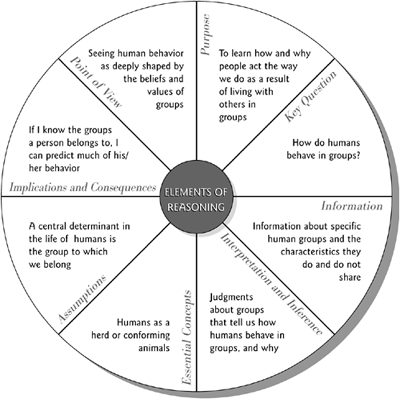Westside Toastmasters is located in Los Angeles and Santa Monica, California
The Nature of Sociocentrism
All of us, to varying degrees, uncritically accept as right and correct whatever ways of acting and believing are fostered in the social groups to which we belong (Figure 11.1). This becomes clear to us if we reflect on what happens when, say, an adolescent joins an urban street gang. With that act, adolescents are expected to identify themselves with:
A name that defines who and what they are;
A way of talking;
A set of friends and enemies;
Gang rituals in which they must participate;
Expected behaviors involving fellow gang members;
Expected behaviors when around the enemies of the gang;
A hierarchy of power within the gang;
A way of dressing and speaking;
Social requirements to which every gang member must conform;
A set of taboos - forbidden acts that every gang member must studiously avoid under threat of severe punishment.
Figure 11.1. The logic of sociology.

For most people, blind conformity to group restrictions is automatic and unreflective. Most effortlessly conform without recognizing their conformity. They internalize group norms and beliefs, take on the group identity, and act as they are expected to act - without the least sense that what they are doing might reasonably be questioned. Most people function in social groups as unreflective participants in a range of beliefs, attitudes, and behaviors analogous, in the structures to which they conform, to those of urban street gangs.
This conformity of thought, emotion, and action is not restricted to the masses, or the lowly, or the poor. It is characteristic of people in general, independent of their role in society, independent of status and prestige, independent of years of schooling. It is in all likelihood as true of college professors and their presidents as students and custodians, as true of senators and chief executives as it is of construction and assembly-line workers. Conformity of thought and behavior is the rule in humans, independence the rare exception.
According to the The Encyclopedia Americana (1950, vol 7, page 541):
[There is an] infinity of variations in human behavior, termed good or evil, well or sick, according to the time and place and surrounding mores. The mescalin intoxicated priest carrying out an Indian ritual is adapted and healthy according to the rules of the game. Under other circumstances and in other places his behavior would probably bring him confinement in the police station or in a mental hospital.
To fail to conform to social expectation is to become subject to being cut off from the group: Here is how such a person is characterized in Tom Brown's School Days (Hughes, 1882):
The person whose appearance had so horrified Miss Winter was drawing beer for them from a small barrel. This was an elderly raw-boned woman, with a skin burned as brown as that of any of the mowers. She wore a man's hat and spencer, and had a strong harsh voice, and altogether was not a prepossessing person. She went by the name of Daddy Cowell in the parish, and had been for years a proscribed person. She lived up on the heath, often worked in the fields, took in lodgers, and smoked a short clay pipe. These eccentricities, when added to her half-male clothing, were quite enough to account for the sort of outlawry in which she lived. Miss Winter, and other good people of Englebourn, believed her capable of any crime, and the children were taught to stop talking and playing, and run away when she came near them.



